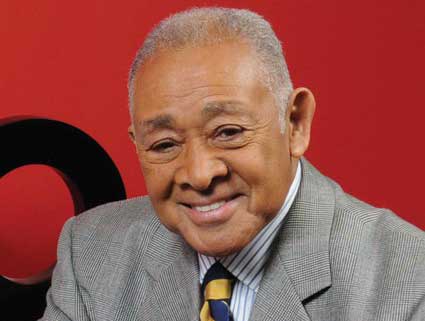
by Bernice Elizabeth Green
Today, Thursday, October 5, the Smithsonian Institution’s National Museum of American History honors the life and career of a pioneer in advertising and marketing as it officially announces the October 17 opening of “Byron Lewis: Ad King Extraordinaire” in Washington, D.C. Mr. Lewis, founder of The UniWorld Group, is gifting materials, artifacts and archives to the institution today at a ceremony, here, in New York.
As an advertising entrepreneur described by The New York Times as the “Original King of Black Media,” Mr. Lewis, was one of the first to break ground in the industry.
Our Time Press knows visionary Lewis on another level related to our own media missions. As a Civil Rights activist and former journalist, Mr. Lewis’s history reveals a compassion for community awareness of key issues of national impact: he was the architect for the marketing of the first Black Convention in 1972 in Gary Indiana and (along with Schomburg legendary champions and scholars Howard Dodson and Roberta Yancey) the engine behind the international outreach associated with multi-year African Burial Ground events honoring the ancestors — and which occurred from 2003 with the reinterment of the remains of formerly enslaved Colonial-era Africans in Downtown Manhattan to the 2006 designation of the site developed by design-build architect Rodney Leon as a National Historic Landmark.
Those ABG events are still alive in the memories of millions around the world.
Archival material connected with Mr. Lewis’ African Burial Ground work will be part of the extensive collection on view at the Smithsonian, Mr. Lewis informed us.
A Smithsonian press release notes: “ Lewis’ contributions to the nation’s business history will be on view beginning Oct. 17 in the museum’s “American Enterprise” exhibition in the Mars Hall of American Business. Visitors will be treated with an immersion in the dramatic arc of labor, power, wealth, failure and success. “Byron Lewis: Ad King Extraordinaire,” will span two cases and his story will debut with that of kitchen table entrepreneur and self-made millionaire Lillian Vernon.
So, what’s the connection between corporate marketing and community engagement? Lewis used marketing principles to develop and direct the team that engaged the world village in a history that was formerly buried and forgotten. It should be noted that Mr. Lewis’ personal and business oeuvre put him in the mainstream of a cultural shift for African Americans in the mid-20th century, including at the crest of the Civil Rights Movement, so he was more than prepared to spark and lead — from behind the scenes — the effort to educate the world about the remains of 419 individuals returned to their resting place in Lower Manhattan.
During spring 2021, Our Time Press had the pleasure of interviewing the history-maker. He revealed the roots of his inspiration, including family, his “village” and church leaders. Born in Newark, New Jersey, Lewis grew up in Queens, New York. He graduated from Long Island University with a journalism degree and was honorably discharged from the U.S. Army in 1955. Despite his credentials, Lewis could not find a media position and spent years working odd jobs, from janitor to office worker. In Harlem, he found opportunities, including selling advertising for Black-owned publications. He co-founded The Urbanite, a Harlem magazine staffed by notables such as James Baldwin and Langston Hughes. Lewis also created the nation’s first Black radio soap opera, Sounds of the City.
Describing his life and work as dedicated “to changing the image of Black people in American life,” Lewis supported and promoted African American artists, filmmakers, activists and politicians. His work included promotional campaigns for the 1971 film Shaft; co-directing the National Black Political Convention in 1972; becoming the owner and producer of “America’s Black Forum,” the nation’s first syndicated Black TV news show; promotions for African American cultural centers and museums such as the Apollo Theater, Black arts festivals and HBCUs (Historically Black Colleges and Universities) and the Schomburg Research Center, and the African Burial Ground project. His international work was in the Caribbean and Africa. Lewis designed and donated the Nelson Mandela Presidential Medallion, a gold coin minted in South Africa in 1994.
Founded in 1969, UniWorld championed multicultural advertising and still promotes the interest of Black and Latina/o consumers. Lewis and UniWorld took the American market by storm, creating muti-media advertisements for clients such as Mars Inc., Metro-Goldwyn-Mayer, AT&T, Stax Records, Avon, Ford Motor, Quaker Oats Company, Burger King, the U.S. Marines and more. In 2013, Lewis was inducted into the Advertising Hall of Fame by the American Advertising Federation.
Through his creation and leadership of a groundbreaking agency that prioritized the Black consumer market, Lewis became known as the “Godfather of Multicultural Marketing”.
His donation includes objects that reflect the history of the UniWorld empire and related businesses, as well as those related to Lewis’ personal story, including a Boy Scouts award, high school yearbooks and even his Omega Psi Phi fraternity paddle. Pictured in numerous magazine profiles, Lewis’ famous office displayed African artifacts and the visual and sculptural work of noted African American artists.
“This rich collection that includes archives and artifacts reveals a throughline of creative storytelling, both as reflected in his advertising career and in the materials that framed his interior office décor, and together, they characterize Lewis’ intersectional worldview,” said Fath Davis Ruffins, curator in the museum’s Division of Home and Community Life.
For more information, go to https://americanhistory.si.edu. For Smithsonian information, the public may call (202) 633-1000.
(Note to readers: For transparency, OTP co-founder Bernice Elizabeth Green was a lead member of Mr. Lewis African Burial Ground marketing team, and OTP co-founder David Mark Greaves, was a camera man and associate editor for the William Greaves Productions film Nation Time! and filmed key sequences of the 1972 Gary, Indiana African American Political Convention.)

